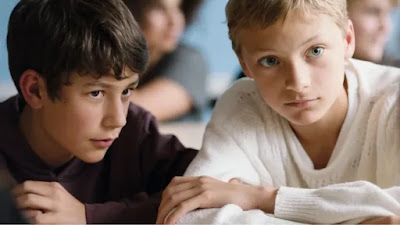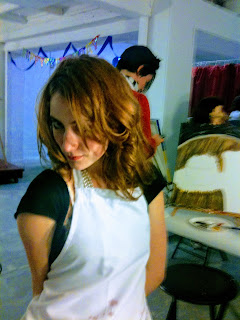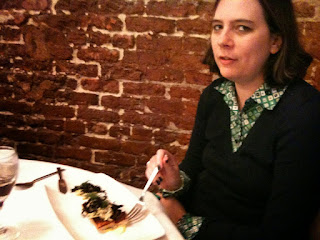Have you recently watched the Belgian film Close (2022), directed by Lukas Dhont and starring two incredible young actors, Eden Dambrine and Gustav De Waele? The movie was highly acclaimed, nominated for an Academy Award, and won the prestigious Grand Prix at the Cannes film festival. The story is a tragic one about two boys. Having read multiple stories of queer, questioning, and gay young people killed or dying of unsuspecting causes, I went into the film with skepticism. For example, I loved the novel Absolute Brightness by James Lecesne — but, again, it is a story of a young, bright, young person who dies because of hatred and homophobia. But I digress — in this story of two young boys who live in a small Flemish town near the flower fields of Brabant, the story is more about adolescent male friendship than anything else.
I Did Harbor Some Assumptions (I Confess)
After watching the trailer, I confess I assumed that the blonde-haired boy, Leo (played by Dambrine), was the more fragile of the two. He appears smaller, in contrast, to Remi (played by De Wael), even though in real life, the former is several years older than the latter, and during filming, De Wael had to wear platform shoes to appear taller than Dambrine. And in an interesting backstory, Lukas Dhont discovered Dambrine on a train, conversing with friends, and asked him to audition for the part — which he did. All of this to say, while my original assumption was wrong, the film is very much about the character of Leo, both in his friendship with Remi, which only takes up less than half the film, and the micro-steps that follow the boys' breakup.
The Exposition of a Boys' Friendship
The movie portrays two thirteen-year-old boys with an unbreakable bond. They are kindred spirits, and their connection is unexplainable. A beautiful scene sets up the friends' bond where Leo, as they both cannot sleep on a summer evening, tells Remi a story about a gecko and its colors. Remi lights up as Leo tells the story, and the camera is positioned intimately close to the two. Film trumps other forms of narrative works where the body, the face, can tell a story, and I was drawn into the ease of their facial expressions and how comfortable the two adolescents are in each other's presence. Leo, in this scene, is portrayed as a poetic and sensitive soul, and his monologue foreshadows what will come. I thought Remi would reject Leo, but it was the reverse.
Their friendship is exposed to the public eye of their peers. Once they start going to a new school, the other kids make note of the boys' friendship and ask if they are a couple. Despite their kindred and beautiful connection, the question "Are you together?" is enough to put a blunt edge between the two kids' bond. In my head, I thought Leo took it to heart and had a more difficult time dealing with that. But actually, in the movie, Leo is more riled up about the accusation and pushes Remi, the other boy, away. The two boys detonate internally, each in their own unique way, and a gulf begins to split between them. It is in this splitting apart that the film attempts to explore.
An Inexplicable Event Happens.
There is a field trip, and Remi is not there. The kids go to the ocean and return, and Leo discovers that Remi has committed suicide. Leo runs frantically, heaving, and arrives at Remi's house, but no one is home, and he sees the door to the bathroom has been busted open. And he knows. In a scene earlier in the movie, Remi was in the bathroom and wouldn't come out, and the mother kept banging on the door. It was after Leo and Remi had a fight. It is evident now. As Leo stares into the window of the empty house, Remi is no longer here. And this is where the story becomes not one of a beautiful friendship but a story of a piece missing, of Leo's tortured journey. And Remi's mother — it was the mother who discovered her son. And when Leo discovers that Remi was in the bathroom when he committed suicide, he internalizes it as his fault.
Leo goes through the motions. He silently attends his friend's funeral. Leo's emotional journey is acute and raw as he tries to find solace in his older brother and silently deals with his feelings at hockey practice and in class. Leo's guilt and sense of responsibility for Remi's death are palpable, and it is painful to watch a child suffer in such a way. He has to listen as other kids talk superficially about Remi. One boy mentions that Remi seemed happy, but Leo breaks the silence and questions whether the boy really knew. "Was he happy? did you know?" Leo asks and storms out of the room. A counselor comes to talk to the middle school class, but the guilt on Leo takes a toll on him. He befriends another boy on his hockey team, but their friendship differs from his friendship with Remi. Leo finds ways to confront or be with Remi's mother, who is also obviously dealing with her grief. And in this part, the story feels fragile and raw — because, as a viewer, I did not know who would break first, Leo or the mother.
The Question of "Why?"
The film raises several questions, such as why Leo was not kinder to Remi, why Remi did not seek help from his loving parents, and why it all ended horrifically. Leo is so shaken by it viscerally, but he is still so young that he cannot verbalize his feelings. Remi is dead, and that reality is painful enough, but Leo also holds on to this feeling that he is responsible for his friend's death. A child should not have to go through this type of suffering, right? However, the director slowly turns the viewer's attention to Leo and his struggle to deal with his friend's death without providing easy answers to the "why" of it. The film culminates in an inevitable confrontation between Remi's mother and Leo, which provides a sense of closure, but not resolution. The scene is in the woods, the trees serving as a backdrop of both characters' pain — a place set away from the real world of school, family, and home. Without giving away too many details, this is how the film ends.
Closing Remarks
The movie's personal and emotional performance from the cast is remarkable, and the actors spent a lot of time together processing the story's magnitude. The film's title, "Close," hits home, portraying the story of two boys who cling to each other. I could identify with the boys — as I, too, had close friendships growing up, and I think this is a phenomenon that many young men experience. Leo and Remi express their feelings about society's bias about close male friendships when girls at lunch call out the boys' friendship, but they first retort, "Well, what about girls? You can have a girly friendship," and no one says anything. The worst crime a society can commit is snuffing out love between two people. I felt like Leo and Remi hold an ineluctable bond that is intense, loving, and special. It is not a gay story, specifically, but one of love, friendship, and the dissolution of those bonds. And it is that dissolution that cries out to heaven for justice.
I finished the movie visibly shaken. I had not felt this emotionally challenged by a movie about love and connections lost since the 2017 film Call Me By Your Name. As a viewer, one can bring their own emotions and experiences to the film, and "Close" explores the complexities of friendship, guilt, and grief, especially among young boys. It sheds light on toxic masculinity, its impact on society, and the intensity of friendships at a young age. Overall, "Close" is a poignant film that leaves a lasting impact and is a deserving nominee for an Academy Award.
Stray Observations
- The film boasts the debut of the two actors Eden Dambrine and Gustav De Waele.
- The working title was "We Two Boys Together Clinging," which is the title of a poem by Walt Whitman, which inspired the work of artist David Hockney.
- The film reflects Belgium's linguistic diversity, with French and Flemish spoken due to the country's small size and the presence of Dutch, Flemish, French, English, and German in daily conversation.
- The small Flemish town where the film is shot is called Wetteren in East Flanders.
- I lived in Belgium for over a year as a student at K.U.L. in Leuven.
Close (2022)
Diaphana Distribution
Directed by Lukas Dhont
Starring Eden Dambrine, Gustav De Waele, Léa Drucker, and Émilie Dequenne
Original Screenplay by Lukas Dhont and Angelo Tijssens.















